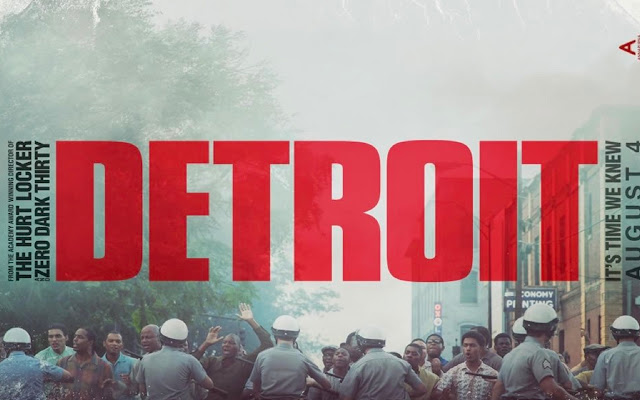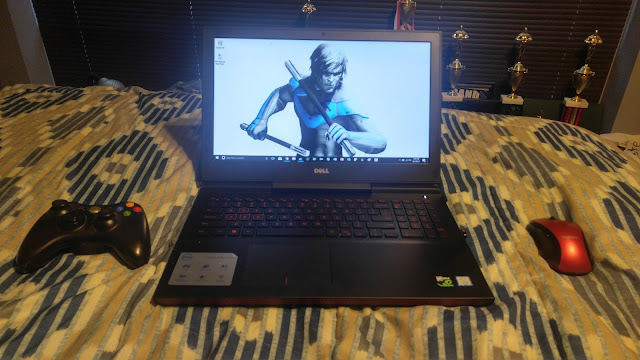Detroit (2017) Review
Detroit Review
Director: Kathyrn Bigelow
Writer: Mark Boal
Producers: Kathryn Bigelow, Mark Boal, Matthew Budman, Megan Ellison, and Colin Wilson
Starring: John Boyega, Will Poulter, Algee Smith, Jason Mitchell, John Krasinski, Jacob Latimore, and Anthony Mackie
Composer: James Newton Howard
Cinematographer: Barry Ackroyd
Editor: William Goldenberg
Production Company: Annapurna Pictures
Part I: Introduction
I was enthusiastic to see this movie just to see what it would offer in terms of biographical storytelling because I liked seeing movies like this where it tells stories that haven't been really explored a lot. I was interested to see the history and story behind this movie. Is it good? Well, yeah.
Part II: Plot Synopsis
Set during 1967 in Detroit, racial tension has reached its high point. Civil unrest and riots start and it's destroying the city. During one night, gunshots have been reported inside a building by the Algiers Motel. Police and the National Guard conduct a search and brutally interrogates guests to confess on the shooter and the location of the gun.
Part III: Direction & Style
DirectionI think the direction here is one of the strongest points of this movie. I think Kathryn did a good job with her direction and I liked how she approached this film. What I like the most about this movie is that it's not so much as about racism towards black people. It also depicts how the oppressed can be just as bad as the oppressors, and it creates a more complex and dimensional take on what happened during that time in history.
Style
This is essentially a biography but it's also more of a crime thriller at the same time. And like I said, it's not purely a movie about black people being beaten, even though that's what most of it is about. It does explore the complex dynamics between the oppressed versus the oppressors.
Part IV: Visual Presentation
Cinematography & FramingThe cinematography here isn't anything special. It's not really a visually intriguing movie. It doesn't use any complex or interesting framing or lighting techniques that will make it some sort of intellectual arthouse or something. Not saying it's an ugly movie either. I'm saying that the film looks fine. It does what it needs to do to visually convey its messages and themes and the intensity of what's going on.
Camerawork
The camerawork is kinda of an interesting topic for me because the cinematographer chose to do a lot of handheld camerawork and it works here. There is some usage of shaky cam, but I think it's actually the right use of shaky cam. It's used to make it more documentary-like or give an unstable feel for the moments, and in my opinion it works well.
Acting
The acting here is good. There are good performances here by Algee Smith, Will Poulter, and Jacob Latimore. In my opinion, John Boyega did okay. It's not a ground-breaking performances but he did fine. To be fair, he didn't really show up a lot.
Part V: Sound Design and Musical Composition
Sound Design
Sound design, again, is solid. I haven't noticed anything wrong with the sound design.
Score
The score is solid. I liked the tracks they played and the music. And I really liked this track that they played that was the same as Baby Driver. If you saw Baby Driver, you'll notice it. Other than that, the composition was okay.
Part VI: Screenwriting & Character Composition
Script & Screenwriting
The script is, for the most part, well made. The storytelling is solid. I liked the themes that it explored towards the racism during that time period and how it relates to today 50 years later.
Character Composition
The character composition isn't really that good. But, I'll give it credit at the same time though, because this movie tries to juggle too many characters in my opinion. The characters were undeveloped and you didn't really care that much about them aside from the fact that they were wrongly beaten.
Pacing
The pacing is my biggest gripe with the film. See, this movie is supposed to be about these group of people being searched in a building near a motel. Yet, that part of the plot doesn't really start until like around half of the movie. Or it felt like it did. I just think the pacing at around the first and second act could have been done a little bit better. And the movie's ending ended kinda like Dunkirk. Again, like in that review, I won't spoil what happens. But, it ends the same way as Dunkirk did. Why are films ending that way? I know I'm nitpicking, but I don't understand. It's kinda funny actually.
Part VII: Verdict & Conclusion
I think this is a pretty solid movie if I analyze it from a filmmaking perspective. I think this could be also a good watch for educational purposes. Obviously, it's not being shown at schools since it's rated R, but I digress. I liked how it tells its story and conveys its messages. I loved its direction from Bigelow. However, the reason why I'm giving it a B+ despite how much I'm praising it is that it doesn't really do much of anything special other than its direction. How film approaches this topic in history in more of a neutral perspective is great. And learning the history of what happened back then is good as well. But, on a technical level, it's nothing much noteworthy in my opinion.
Score: B+


Comments
Post a Comment